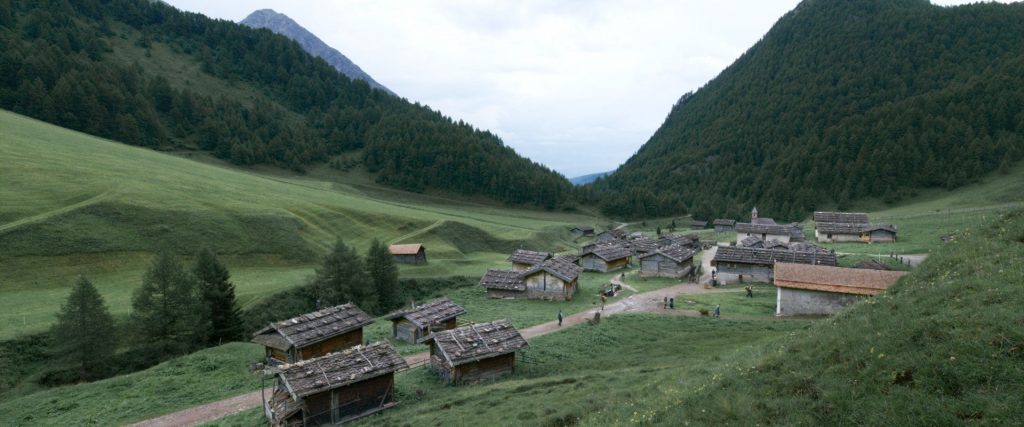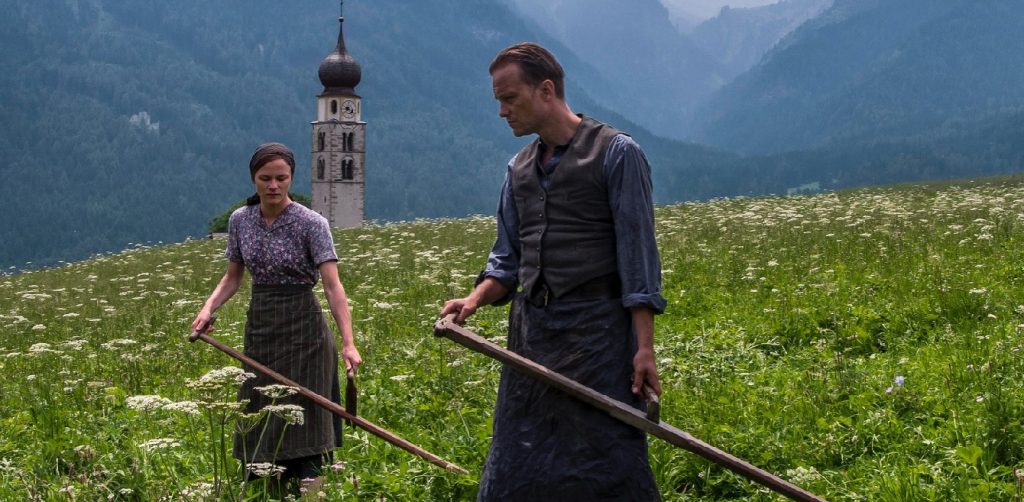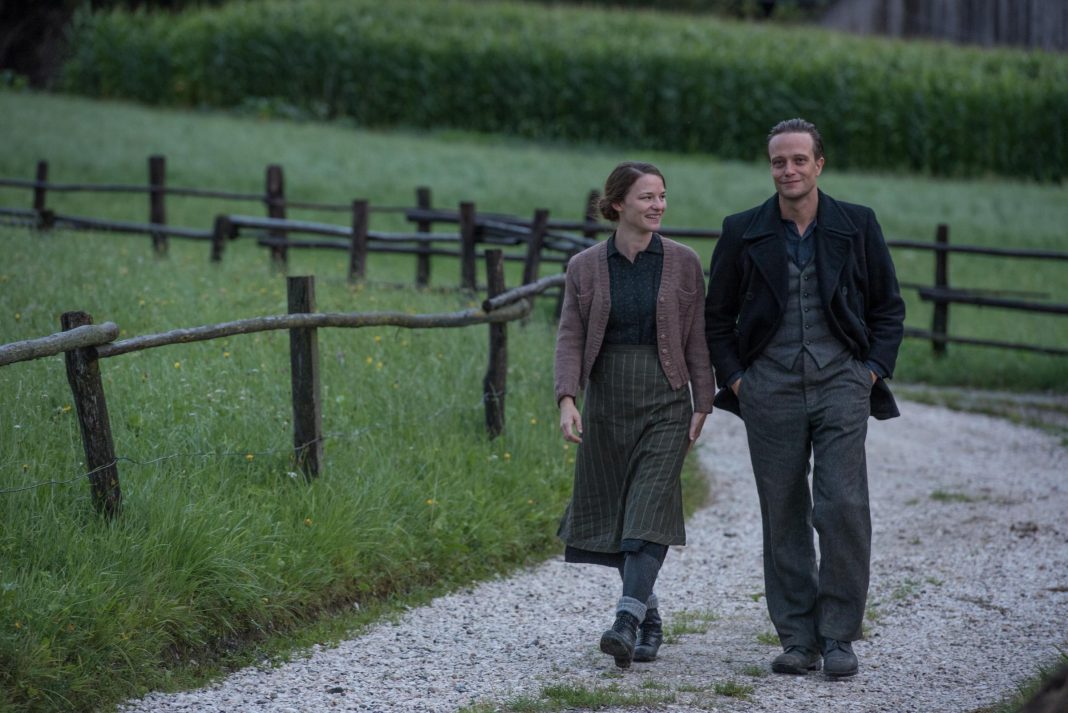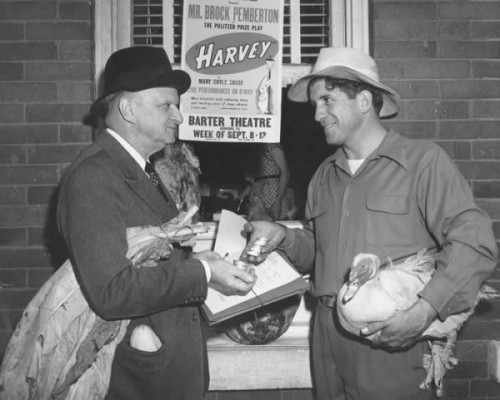(This essay contains spoilers)
Waco, TX. Anyone who has read Kierkegaard’s Fear and Trembling can recollect his portrayal of an Abraham whom none can understand, a man willing to sacrifice his son Isaac in order to take the leap into faith—either a crazed monster or the most authentic person to ever live. But few think back to the knight of faith Kierkegaard describes at the beginning of the work: a humble little man who takes joy in everything he sees, loves his wife and family, helps his neighbors, takes his walks in the woods, attends church every Sunday. A bourgeois philistine: “why, he looks just like a tax collector!” Kierkegaard’s pseudonymous Johannes de Silentio gasps. And yet Johannes realizes that, in each of these little movements, this man is taking the leap of faith, with each little finite step making “the movement of infinity.”
Franz Jägerstätter, the protagonist in Terrence Malick’s A Hidden Life (just now coming to wide release in the states between the coasts), is such a knight of faith. The film tells his true story, that of a devout Austrian farmer in the Alps who refused to swear an oath of allegiance to Hitler in WWII, and for that was shunned by his village and imprisoned, tried, and executed by the Reich in 1943. Franz (August Diehl) is by all appearances unspectacular. He is a farmer in the idyllic mountain village of St. Radegund, Austria, where he helps at his local Catholic church, drinks beer with friends, reports with them—it seems without any resistance—for military training as war seems to be brewing in Europe, and then returns home to work again. He is no pacifist or spiritual guru. Rather, he is a simple, devout man who works when it is time to work, plays when it is time to play, and takes part in community obligations. And he loves his wife, Fani (Valerie Pachner), and their children. Malick, who has worked as a champion of sorts for family life throughout his oeuvre, begins the film with scene after scene showing Franz kissing his wife, working together with her happily in the fields, and playing and caring for their daughters.
Franz does not seem like a man of ideas; rather, he is someone who loves people, places, things, and God—above all, his people, place, things, and God. But it is precisely this love which disturbs his conscience when Nazi planes begin flying over his village and the Reich annexes Austria. While everyone around him succumbs to Nazi ideology, Franz grows increasingly uneasy. He tries to keep quiet as he seeks advice from the local priest, but eventually he can no longer keep his objections secret. He refuses to contribute to the war effort, villagers take notice and interrogate him, and he must now come out as one who refuses to pledge allegiance to Hitler. Finally, the day comes when he is called up again to active duty. He objects to taking the required oath and is immediately arrested.
The rest of the film follows Franz’s imprisonment, trial, and eventual execution, as well as the lives of his wife, his fellow prisoners, and the villagers of St. Radegund throughout the ordeal. What is so striking about Franz is how much he remains the same man in prison as he was in his beloved fields. He gives few reasons to his captors for his refusal—he offers no high-flying intellectual defense. He spends more time thinking about his wife and the home he misses, praying to God for strength to endure, and reciting words of Scripture in his mind. He faces questions from within and without over whether his steadfastness is worth it—he is only one man in a prison, no one will remember him, and nothing of the course of the war will change because of him.
The fate of his wife and children seems a more worthy question for him: because of his actions, he is stripping them of a father and husband, forcing them to eke out an existence for themselves in great suffering. In short, he is refusing the very people and place he holds so dear.
This refusal strikes at the heart of what Kierkegaard was getting at in Fear and Trembling. How can the knight of faith resign himself of those he loves, and still love them? How can one who loves the world give it up—and further, hope to gain it all back, to, in a sense, redeem it? This is the great mystery of faith for Kierkegaard. Franz’s particular loves and his trial of sacrifice reach this deepest mystery. He concludes with a simple trust in God throughout the trial, and in this, he reaches an epiphany of joy, not resignation, as he continues dwelling on his beloved mountains and his wife back home. When asked if he wants to be freed, he replies, “but I’m already free.”
And so in his trial, he redeems those around him, little by little. Only Malick can make the following scene one of a film’s most striking: after being sentenced to death, Franz is taken to visit a store in the city and, seeing an umbrella fallen by the door, he sets it back aright. Condemned to lose the world, he patches the littlest pieces of it back together on his way out of it. He does the same for his fellow prisoners, comforting them in their fear unto death. He even has patience for his interrogators. And no matter how much they claim his witness is meaningless, the German officers cannot help but feel convicted by his presence.
In this respect, Franz’s eventual sacrifice is redemptive, not just martyrial, and that is the great Christian triumph of this film. His fidelity to his wife, his farm, and even the village that now hates him does not waver, and when he is finally called to death, his sacrifice acts as a testament to the worth of everything and everyone he must give up. Upon his execution, a lone villager rings the church bells back at St. Radegund, and the rest of the villagers at work in the fields—who have cruelly afflicted Franz and his family throughout—pause and remove their hats. In their solemn faces we viewers see the smallest glimpse of a returned humanity. Can Franz’s sacrifice give us a sense of grace for even these fickle people? This is the most crucial question. A sacrifice for the sake of virtue, goodness, and morality can spur viewers on to good works in the future, but it cannot take away evil already committed. Yet Franz’s martyrdom reaches beyond this sacrifice to something higher, even a forgiveness of sins.

Throughout the film, Malick cares just as much to meditate on a way of life that has been lost as he does to tell the story of a hero. The film begins with an overview of the Jagerstätter family and St. Radegund before the war. The villagers work hard in the fields, go to church, laugh and dine together. Franz and Fani share duties on the farm and embody a genuine complementarity between husband and wife. It is a hard, simple, and beautiful life embedded in the cycles of the land. (It is not by accident that Malick was an executive producer of Look & See: A Portrait of Wendell Berry.)
Little by little, that life falls apart as the mayor falls prey to Nazi ideology, townsfolk replace the greeting Grüß Gott with Heil Hitler, and propaganda films portray bespoke-suited fascists touring the conquered Alps as if they represented its ‘true essence.’ In something of a first, Malick intersperses the beautiful, natural cinematography for which he is famous with old, grainy war footage and shots of a locomotive rolling down the tracks, a train which Franz dreams is inevitable, and one which he eventually must ride to his fate. Not even a little village high up in the mountains can withstand the onslaught of modernity, and in fact its habitants bear particular responsibility, as they forsake the beauty of their place for the ugly copies of reality given them by black-and-white reels of tanks and bombers. All the while, Malick returns to shots of the mountains and the fields outside the village, ignored by all except Franz, the one wasting away in a prison in the middle of fascist modernity’s capital, Berlin. Why did those surrounded by beauty forsake it for such ugliness? And in the present age, can harmony, beauty, and innocence still exist in anything more than memory? Does the man who turned away from beauty deserve to get it back? These are questions Malick’s cinematography asks.
For more questions, and an ultimate answer, one must turn to what this film is ultimately about, which is not a lone martyr or a village’s fall from innocence but the love between a wife and her husband. One might fault Kierkegaard’s Abraham for not confiding in Sarah about his faith. In a way, Malick answers this critique by giving equal attention to both Franz and his wife Fani. They commune together always, whether at the beginning of the film in the fields, in the middle of the film through letters, or at the end of the film in an interrogation room. Franz never leaves her in the dark about his choices, they debate over the consequences together, and Fani stands by his side no matter what choice he might make.
And she suffers just as he does for that choice. Not only must she lose the comfort of her partner, she must work the fields alone, stand as a traitor in the eyes of her townspeople, and carry on an ordinary life while every force conspires to defeat her. In her most affecting scene, she remembers God’s promise that to whomever knocks the door will be opened, and then she knocks on a neighbor’s door to no answer. While Franz’s suffering brings him a martyr’s joy, Fani’s brings her no such revelation. Rather, she only finds community by visiting the local widow whom no one else will talk to. I suspect every Christian has gone or will go through this time in life: when one is so spent and empty, and yet the love one can get will only come by giving oneself furthermore to others. And yet Fani continues in faith, and she finds love, little by little, usually in other rejected and depressed members of the community.

In a way, Fani reflects the suffering of the rest of us called to be knights of faith as ordinary people afflicted by little devils and larger, impersonal forces. Because we are not yet given the vocation of extraordinary sacrifice, because we are not heroes, because we cannot ‘change the world,’ we may not receive a catharsis that would sustain a hero, and instead we must do without. In a strange turn, the hidden life can prove to be that of the martyr’s beloved rather than the martyr. But in the midst of whatever trials come to us and whatever revelations do not, we are still called to serve, to do good, and to love our neighbors as ourselves. And to believe in the voice that may not choose to speak to us, to hold fast to the goodness given to our beloved but unseen by everyone else—that is the vocation of faith for many of us.
What this faith instills is hope: we may not hear, feel, or see now, but we will. Kierkegaard concluded that Abraham’s great faith was not his willingness to lose Isaac but his hope that, no matter the course, he would receive him back again. Likewise, Franz’s sacrifice can only make sense with a hope for redemption. If his body will not be resurrected to be with his wife and children again, then he of all people is most to be pitied. Fani finds such hope, as she ends her questioning with a particular answer: a prophecy of a time when we all will return to the land and treat it right anew, a time when we will see beauty again and we ourselves will be beautiful, a time when the world will not be left behind but renewed, regained. Fani promises her love, Franz, the man who loved her and this world so much that he gave it all up to God, that she will meet him there.
May we too meet them there.













Beautiful. Simply beautiful.
Excellent. I’ve read many other reviews and this one comes closest to capturing the film’s essence.
Franz has and lives out pietas, a sense of duty with caritas, to God, to fatherland, to community, to family and to Church. Precisely because of his pietas, he cannot take to oath to Hitler whom he rightly apprehends to be the embodiment of an evil which is encroaching on all that he loves and to which in love he owes a duty of fidelity. He will be, however, tempted to take the oath because not taking the oath will demand his death; and death will cut him off from all that he loves. His faith takes him beyond that moment, however; for there is the promise which engenders hope that all things will be made new.
Comments are closed.